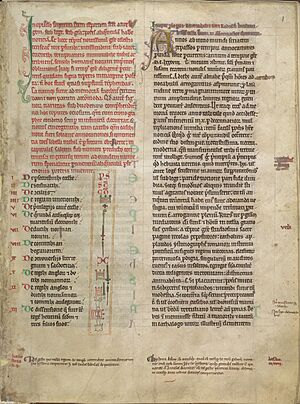Ralph de Diceto facts for kids
Ralph de Diceto (also known as Ralph of Diss) was an important church leader and writer who lived from about 1120 to 1202. He served as an archdeacon (a senior church official) in Middlesex and later became the dean (the head priest) of St Paul's Cathedral in London around 1180. Ralph is famous for writing two major history books: the Abbreviationes chronicorum and the Ymagines historiarum.
Contents
Ralph's Early Life and Career
Ralph de Diceto first appears in historical records in 1152. At this time, he became the archdeacon of Middlesex. Historians believe he was born sometime between 1120 and 1130. We don't know much about his family or where exactly he came from. Some people think his last name, Diceto, might come from a place called Diss in Norfolk, England. However, it could also be from other places in France like Dissay, Dicy, or Dizy.
By 1152, Ralph had already earned a "master of arts" degree, which means he was well-educated, likely from studying in Paris, France. He was known for being very smart and honest. Important bishops of his time, like Arnulf of Lisieux and Gilbert Foliot, respected him greatly.
Ralph was involved in a big disagreement between King Henry II and Archbishop Thomas Becket. He sided with the King, just like his friends. Even though he showed some understanding for Becket during a meeting in 1164, Ralph believed Becket's actions were not well thought out. He even gave advice to people who were seen as Becket's main opponents.
In 1166, Ralph was chosen to represent the English bishops when they protested against Becket's actions. Despite this important role, Ralph usually preferred to stay out of the spotlight. He was known for being fair-minded but also a bit shy.
Becoming Dean of St Paul's
Around 1180, Ralph became the dean of St Paul's Cathedral in London. This was a very important position. As dean, he did a great job managing the church's lands and making sure the priests and staff followed the rules. He even paid to build a new house for the dean.
Ralph was a dedicated scholar who loved studying history. Around the time he became dean, he started gathering information to write about the history of his own time. He had many important friends, including Richard Fitz Nigel, William Longchamp (who worked for King Richard I), and Walter de Coutances. These friendships helped him collect a lot of valuable information for his historical writings.
Ralph's Historical Writings
Ralph de Diceto's two main books, the Abbreviationes chronicorum and the Ymagines historiarum, tell the story of the world from the birth of Jesus Christ up to the year 1202.
- The Abbreviationes chronicorum covers history until 1147. This book shows Ralph's great learning, but it mostly uses information from other books that already existed.
- The Ymagines historiarum starts by using information from other writers and letters from Bishop Foliot. However, around 1172, it begins to include Ralph's own original research. By 1181, it becomes a record of events as they were happening.
While Ralph's books are not as detailed as some other histories from that time, like those by Roger of Hoveden, they are still very useful. Ralph sometimes made mistakes with dates, and he didn't always choose the most important documents to include. However, he was good at understanding political situations, and his books add important details that help us understand that period better. Because of this, the Ymagines is considered a valuable, though secondary, source for historians.
Editions of Ralph's Works
- Stubbs, William (ed.). The Historical Works of Master Ralph de Diceto, Dean of London. 2 vols. 1876.
- Volume 1 (online)
- Volume 2 (online)
- Hale, W. H. (ed.). The Domesday of St Pauls. 1858.
- The Domesday of St Pauls (online)
Images for kids
 | William Lucy |
 | Charles Hayes |
 | Cleveland Robinson |



